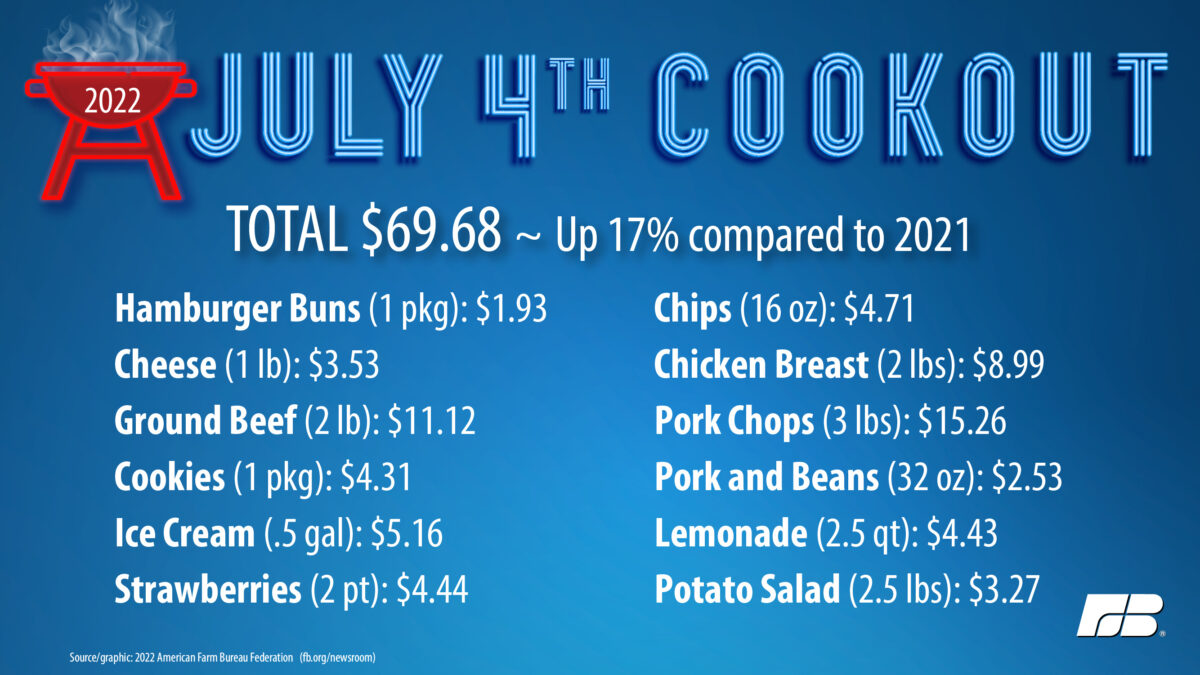Increasing Food Costs Impacting Summer Cookouts
TOPICS
Marketbasket SurveyZippy Duvall
President

Zippy Duvall
President
When I think of summer, I think about all the time spent with family and friends around the grill, watching baseball and softball games, and cooling off at the lake. And one of my favorite activities each summer is getting my family together on July 4th to celebrate our nation. We love to have a cookout with plenty of smoked meat, burgers, sweet corn, homemade side dishes, and of course, some apple pie. And like most Americans, we’ll be paying more for our celebration this year.
Every year, the American Farm Bureau, with the help of volunteer shoppers around the country, calculates the average cost for a July 4th cookout. This year, it will cost about $70 to feed ten people. That’s a 17% increase compared to a year ago. Inflation, ongoing supply chain disruptions, and the war in Ukraine are all contributing to the substantial increase in food prices.
While the cost per person remains relatively low at $7 per person, the increase in the cost of food and supplies is a real concern here in the United States and worldwide. We have been fortunate to enjoy the world’s safest, most affordable food supply. We are also blessed to live in a country with a strong network of food banks and programs to help those in need. That network is strong because of the generosity of local communities and the spirit of giving back that marks our country. But for millions of people around the world, the increasing cost of food and decreasing availability could lead to children going to bed hungry and even starvation.
While the cost per person remains relatively low at $7 per person, the increase in the cost of food and supplies is a real concern here in the United States and worldwide.
One of the most significant increases from last year was the cost of two pounds of ground beef, up 36% from last year. While prices are up, USDA data shows that what farmers receive for their cattle is down 14%. (I know that firsthand.) So while consumers are paying more, farmers aren’t necessarily making extra money. And, on average, farmers get about 8% of every dollar Americans spend on food. The other 92% covers everything from food processing to transportation and marketing.
On the farm, the cost of supplies has increased drastically. While some farmers may be getting bigger checks, fuel prices have doubled and fertilizer prices have tripled, meaning farmers are making less money. For other farmers, the check size hasn’t changed or has gone down even while their costs continue to increase.
A resilient food supply is critical to our national security. We continue working to alleviate supply chain disruptions to bring down costs for farmers, ranchers, and ultimately American consumers. Recently, Congress passed new reforms for the ocean shipping industry that should help alleviate bottlenecks at our ports. And we continue advocating for reforms to rail shipping too. Increased delays on our rail lines increase the cost of farm inputs and food on grocery store shelves.
We are not immune to the effects of global disruptions either. The war in Ukraine is having a significant impact on the availability of both food and fertilizer. Before the war, Ukraine and Russia provided 14% of the world’s wheat and 28% of the world’s fertilizer. Now, Russia is blocking exports from Ukraine and restricting their own exports, severely limiting fertilizer availability and contributing to increased food costs. It may take years for these markets to return to normal, if they do at all. The cascading effects of this disruption serve as a powerful lesson in the importance of stable, productive agriculture.
Despite the challenges, America’s farmers and ranchers continue to work hard each day to grow the food we need to sustain our families. We’re proud to do our part to deliver safe and healthy food for Americans and families around the world. Even with the additional cost, my family still plans to fire up the grill this Independence Day. We’re fortunate in many ways and we don’t take it for granted. We have enough food to eat, family to share it with and the freedom to pursue our dreams because we are blessed to be living in the enduring experiment in democracy that is the United States of America.
Zippy Duvall
President
Vincent “Zippy” Duvall, a poultry, cattle and hay producer from Greene County, Georgia, is the 12th president of the American Farm Bureau Federation.
Top Issues
VIEW ALL